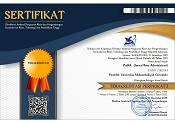Governability in Central Sulawesi: An Assessment of Government Capacity to Support Minorities of the Regional Representative of Central Sulawesi Province
Abstract
Keywords
Full Text:
PDFReferences
Asrifai. (2019). Dinamika dan Pokok-Pokok Perubahan Undang Undang Pemerintahan Daerah. 14 No 02 (Academica Jurnal Ilmu Sosial dan Ilmu Politik Fisip Universitas Tadulako), 1617–1628.
Asrifai. (2019). Transformasi Manajemen Pemerintahan Daerah Pasca Pemilihan Gubernur dan Wakil Gubernur Sulawesi Tengah Tahun 2016-2021.
Bahri, S. (2019). Elit dalam Dinamika Politik Pengisian Jabatan Wakil Gubernur. 14 No 02 O(Academica Jurnal Ilmu Sosial Dan Ilmu Politik Fisip Universitas Tadulako, 14 No 02, 1629–1645.
Buchanan, J. ., & Tullock, G. (1962). The Calculus of Consent: Logical Foundations of Constitutional Democrazy. Ann Arbor, Michigan: University of Michigan Press.
Coppedge, M. (2001). Paper prepared for presentation at the conference on “Representation and Democratic Politics in Latin America,” organized by the Department of Humanities of the Universidad de San Andrés and the Department of Political Science of the University of Pittsbu. Conference on “Representation and Democratic Politics in Latin America,” Organized by the Department of Humanities of the Universidad de San Andrés and the Department of Political Science of the University of Pittsburgh.
Djanggola, L. (2018). Governor of Sul-Teng. Interview on 07 June 2018.
Efendi, D., Agustiyara, & Putra, H. A. (2019). Natural Disasters Management and the Challenge of Governability in Indonesia. Indian Journal of Public Administration, 65(3), 627–645. https://doi.org/10.1177/0019556119840953
Ernst, R., & Haar, J. (2019). Globalization, Competitiveness, and Governability. In Globalization, Competitiveness, and Governability. https://doi.org/10.1007/978-3-030-17516-0
Fiorina, M. . (1992). An Era of Divided Government. Political Science Quarterly.
Garna, K. J. (2001). Metode Penelitian Sosial, Penelitian Dalam Ilmu Pemerintahan Desain dan Rencana Penelitian. Primoko, Akademika. Bandung.
Huntington, S., Crozier, M., & Joji, W. (1975). The Crisis of Democracy: Report to the Trilateral Comission. In American Sociological Review (Vol. 3, Issue 6). https://doi.org/10.2307/2084726
Ibad, S., & Musdalifah, M. (2020). Partai Politik: Tinjauan Strategi Dalam Meraih Dukungan Massa. Publik (Jurnal Ilmu Administrasi), 8(2), 89. https://doi.org/10.31314/pjia.8.2.89-100.2019
Kooiman, J. (2008). Exploring the Concept of Governability. Journal of Comparative Policy Analysis: Research and Practice, 10(2), 171–190. https://doi.org/10.1080/13876980802028107
Kooiman, J., M, B., R, Chuenpagde, R., R, M., & R, P. (2008). Interactive Governance and Governability : an Introduction. The Journal of Transdisciplinary Environmental Studies, Vol 7 No 1, 1–11.
Kooiman, J., & Mahon, R. (2008). Interactive Governance and Governability : An Introduction. 7(1).
Kübler, D., Rochat, P. E., Woo, S. Y., & van der Heiden, N. (2020). Strengthen governability rather than deepen democracy: why local governments introduce participatory governance. International Review of Administrative Sciences, 86(3), 409–426. https://doi.org/10.1177/0020852318801508
Laakso, M., & Taagepera, R. (1979). “Effective” Number of Parties A Measure with Application to West Europe. Comparative Political Studies, 12(1), 3–27. https://doi.org/10.1177/001041407901200101
Mainwaring, S. (1993). Presidentialism, multipartism, and democracy: The Difficult Combination. In Comparative Political Studies (Vol. 26, Issue 2, pp. 198–228). https://doi.org/10.1177/0010414093026002003
Mallarangeng, A. (2018). A Former of Tim Perumus UU Pemerintahan Daerah. Interview, November 2018.
Pratama, H. M., & Maharddhika. (2016). Prospek Pemerintahan Hasil Pilkada Serentak 2015. Jakarta, Yayasan Perludem.
Widhiastini, N. W., Subawa, N. S., Sedana, N., & Permatasari, N.
P. I. (2019). Analisis Faktor-Faktor Yang Mempengaruhi Partisipasi Masyarakat Dalam Pilkada Bali. Publik (Jurnal Ilmu Administrasi), 8(1), 1. https://doi.org/10.31314/pjia.8.1.1-11.2019
Article metrics
Refbacks
- There are currently no refbacks.
Copyright (c) 2021 Publik (Jurnal Ilmu Administrasi)

This work is licensed under a Creative Commons Attribution-ShareAlike 4.0 International License.

Publik (Jurnal Ilmu Administrasi) is licensed under a Creative Commons Attribution-ShareAlike 4.0 International License.










